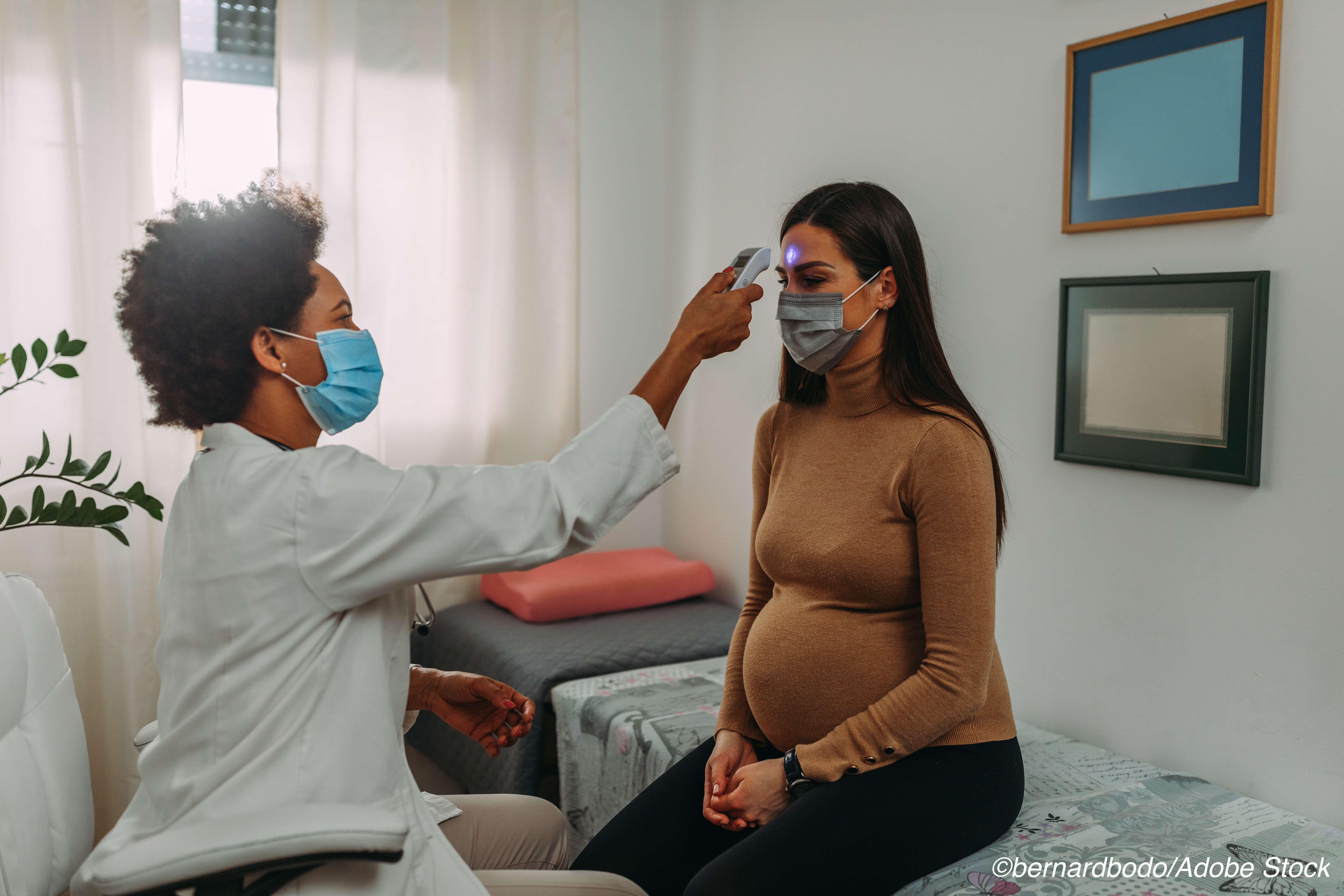
Having Covid-19 during pregnancy was associated with worse outcomes, such as maternal mortality, preeclampsia, and preterm birth, in an international prospective study involving more than 2,000 women.
Compared to pregnant women without Covid-19, those with a Covid-19 diagnosis had a risk for death that was 22 times higher (11 vs.1 death, relative risk, 22.26; 95% CI, 2.88-172.11). The deaths mostly occurred in less developed areas without comprehensive hospital intensive care services.
Neonatal outcomes coincided with the severity of maternal illness, and women with asymptomatic Covid-19 were found to have similar pregnancy outcomes to women without SARS-CoV-2 infection, with the exception of having a higher risk for preeclampsia.
Findings from the INTERCOVID Multinational Cohort Study, which is one of the largest to date to report on pregnancy outcomes among women with Covid-19, were published online April 22 in JAMA Pediatrics.
Conducted by the global INTERGROWTH-21st Consortium, which includes more than 300 researchers and clinicians from 18 countries, the study involved 706 pregnant women with a laboratory-confirmed Covid-19 diagnosis matched 1:2 to 1,424 pregnant women without Covid-19 who had similar demographic characteristics.
Enrollment occurred from March to October 2020 at 43 institutions in 18 countries. For every Covid-19 case, two pregnant, unmatched, consecutive women who were not infected were concomitantly enrolled after each infected woman was identified, at any stage of pregnancy or delivery. The women and their newborns were followed up until hospital discharge.
Compared to women who were not infected, women with a Covid-19 diagnosis were more likely to be overweight early in pregnancy (48.6% vs. 40.2%).
They also had a higher risk for preeclampsia/eclampsia (relative risk [RR], 1.76; 95% CI, 1.27-2.43), severe infections (RR, 3.38; 95% CI, 1.63-7.01), intensive care unit admission (RR, 5.04; 95% CI, 3.13-8.10), maternal mortality (RR, 22.3; 95% CI, 2.88-172), preterm birth (RR, 1.59; 95% CI, 1.30-1.94), medically indicated preterm birth (RR, 1.97; 95% CI, 1.56-2.51), severe neonatal morbidity index (RR, 2.66; 95% CI, 1.69-4.18), and severe perinatal morbidity and mortality index (RR, 2.14; 95% CI, 1.66-2.75).
Among the other main findings:
- Fever and shortness of breath for any duration was associated with increased risk of severe maternal complications (RR, 2.56; 95% CI, 1.92-3.40) and neonatal complications (RR, 4.97; 95% CI, 2.11-11.69).
- Asymptomatic women with Covid-19 diagnosis remained at higher risk only for maternal morbidity (RR, 1.24; 95% CI, 1.00-1.54) and preeclampsia (RR, 1.63; 95% CI, 1.01-2.63).
- Cesarean delivery (RR, 2.15; 95% CI, 1.18-3.91), but not breastfeeding (RR, 1.10; 95% CI, 0.66-1.85), was associated with increased risk for neonatal test positivity.
Just over 1-in-10 babies (12.1%) born to women who tested positive for Covid-19 also tested positive for the virus, which the researchers noted was a higher rate than was reported in a recent systematic review.
In that analysis of 49 studies involving 655 women and 666 newborns, 2.7% of babies delivered vaginally and 5.3% of those delivered via cesarean section tested positive for Covid-19.
“Our results mostly reflect Covid-19 diagnosis in the third trimester,” wrote INTERCOVID study researcher Artis Papageorghiou, MD, of the University of Oxford Women’s Center, Oxford, UK, and colleagues. “Thus, women with Covid-19 diagnosis or whose pregnancy ended earlier in pregnancy are underrepresented either because our study was exclusively hospital based or earlier infection may manifest with mild symptoms, which are either ignored or managed in primary care. Alternatively, most women might have avoided the hospital until late in pregnancy or when in labor. Clearly, the effect of Covid-19 early in pregnancy needs urgently to be studied.”
In accompanying commentary, infectious disease specialist Catherine Mary Healy, MD, of Baylor College of Medicine, Houston, wrote that the study findings confirm that, similar to other respiratory diseases, pregnant women with Covid-19 “have a unique risk for severe disease and poor outcomes.”
“However, it is important to recognize that the absolute risks of severe Covid-19 for pregnant women are low, as acknowledged by the American College of Obstetricians and Gynecologists,” she wrote.
Healy added that while maternal mortality was greatly elevated in women with Covid-19 in the study, the deaths largely occurred in regions where medical resources and ICU care were less readily available.
“It is noteworthy that while pregnancy itself is a risk factor, this and other reports stress that other comorbidities associated with poor outcomes from Covid-19, such as overweight, preexisting diabetes, hypertension and chronic respiratory illnesses, and even demographic variables, also play a role,” Healy wrote. “In addition, the presence of symptoms and subtypes of clinical symptoms (for example, fever and shortness of breath) may have some value in terms of interventions in the future. Longitudinal study and further research studies are critical in better defining this risk.”
- Having Covid-19 during pregnancy was associated with worse outcomes, such as maternal mortality, preeclampsia, and preterm birth.
- Compared to pregnant women without Covid-19, those with a Covid-19 diagnosis had a risk for death that was 22 times higher.
Salynn Boyles, Contributing Writer, BreakingMED™
This research was funded by the University of Oxford. Study coauthor Papageoghiou reported grants from National Institute for Health Research Biomedical Research Center and other support from Intelligent Ultrasound outside the submitted work. Coauthor Gunier reported receiving grants from the University of Oxford during the conduct of the study.
Healy reported no relevant conflicts.
Cat ID: 41
Topic ID: 83,41,730,933,190,926,41,192,927,151,928,925,934

